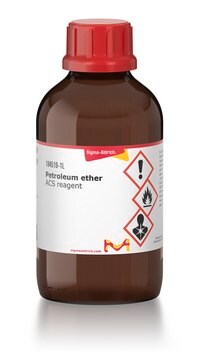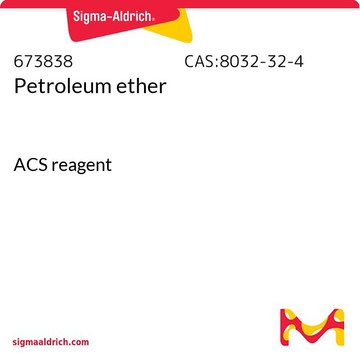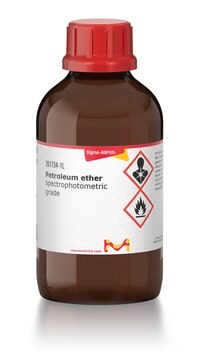Recommended Products
grade
ACS reagent
Quality Level
vapor density
2.5 (vs air)
vapor pressure
25.8 psi ( 55 °C)
7.99 psi ( 20 °C)
form
liquid
autoignition temp.
475 °F
expl. lim.
8 %
impurities
acidity, passes test
evapn. residue
≤0.001%
color
APHA: ≤10
refractive index
n20/D 1.363 (lit.)
bp
30-60 °C (lit.)
35-60 °C
density
0.64 g/mL at 25 °C (lit.)
InChI
1S/C7H7.BrH.Mg/c1-7-5-3-2-4-6-7;;/h3-6H,1H3;1H;/q;;+1/p-1
InChI key
ZRJNGFJIBZKXTP-UHFFFAOYSA-M
Looking for similar products? Visit Product Comparison Guide
General description
Application
- Non-polar compounds from various samples, such as plant materials or organic mixtures.
- Carotenoids from the marine Thraustochytrium sp. ONC-T18.
Signal Word
Danger
Hazard Statements
Precautionary Statements
Hazard Classifications
Aquatic Chronic 2 - Asp. Tox. 1 - Flam. Liq. 1 - Skin Irrit. 2 - STOT SE 3
Target Organs
Central nervous system
Storage Class Code
3 - Flammable liquids
WGK
WGK 2
Flash Point(F)
-56.2 °F
Flash Point(C)
-49 °C
Regulatory Listings
Regulatory Listings are mainly provided for chemical products. Only limited information can be provided here for non-chemical products. No entry means none of the components are listed. It is the user’s obligation to ensure the safe and legal use of the product.
EU REACH Annex XVII (Restriction List)
Certificates of Analysis (COA)
Search for Certificates of Analysis (COA) by entering the products Lot/Batch Number. Lot and Batch Numbers can be found on a product’s label following the words ‘Lot’ or ‘Batch’.
Already Own This Product?
Find documentation for the products that you have recently purchased in the Document Library.
Customers Also Viewed
Our team of scientists has experience in all areas of research including Life Science, Material Science, Chemical Synthesis, Chromatography, Analytical and many others.
Contact Technical Service










